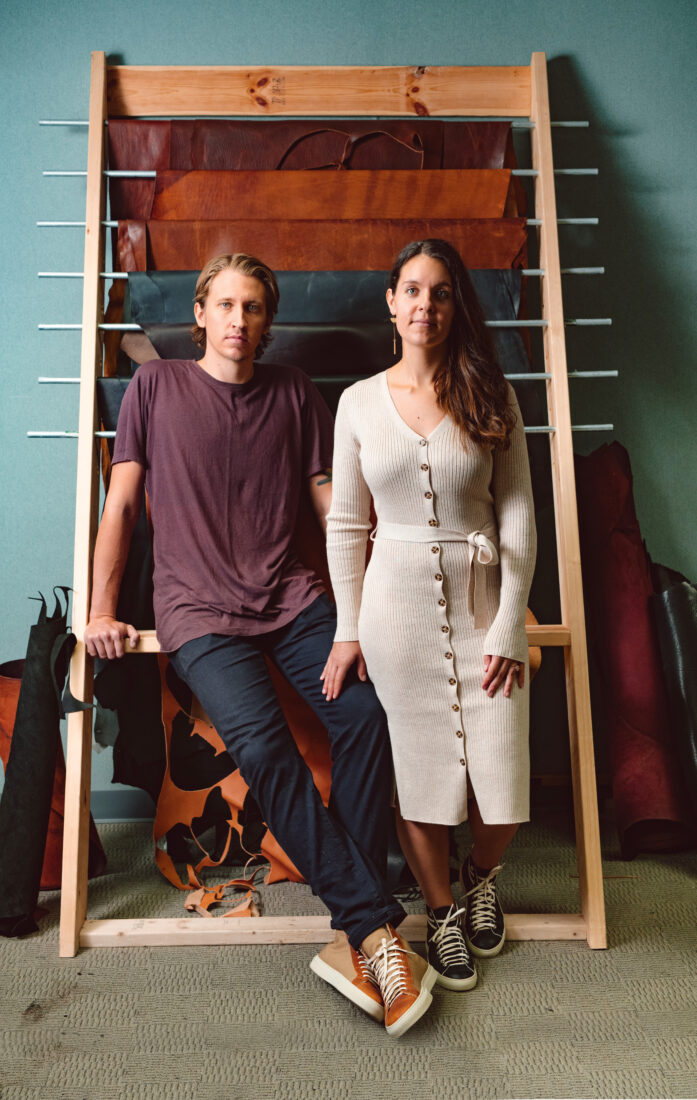Three days after Hurricane Helene swept through Western North Carolina, when Justin James was finally able to connect to a Starlink, he got the news: The factory in Fletcher where James and his wife, Amanda, ran Opie Way, a hyperlocal (and hyper-chic) sneaker brand that took home G&G’s top prize in the 2020 Made in the South Awards, had been utterly destroyed by the storm.
“Our landlord sent me a bunch of pictures, but only two came through,” James says. “One was of the outside of the building, and you could see there was a van with a water line all the way up to the windows. The parking lot was full of our rubber soles.”
The flooded factory.
A few days later, when James was finally able to get to the warehouse, he walked through the rubble with a flashlight and a headlamp. More than six feet of water had rushed through the building like a river, washing away tools, machinery, packaging, and the inventory of roughly three hundred pairs of ready-to-wear sneakers that Opie Way had been building up for the first time in its history to release for the holidays. (Previously, all of their shoes had been made to order.) James had poured his soul into Opie Way for almost a decade, and in one weekend, it was gone. “My family has committed to this being our life. I can’t imagine doing something else, given how much we put into it,” he says. “They say in business school, if you get to that five-year mark with your company, that’s a really good sign. We were one month shy of being five years in business.”

Opie Way founders Justin and Amanda James.
But unbeknownst to James, across the state, his friends and colleagues were mobilizing to help. “Everyone was thinking the same thing: How can we help? What can we do?” says Victor Lytvinenko, the founder of Raleigh Denim (another former Made in the South honoree). Together with around thirty like-minded makers, including Evan Morrison of Hudson’s Hill in Greensboro, Lytvinenko put together a raffle and a GoFundMe for James and his family, raising nearly $100,000 to help Opie Way rebuild.
Lytvinenko had known James for six or seven years, mentoring him in the early days of Opie Way. “I will be completely honest, starting a clothing brand is a pretty hard thing to do, and I tried to talk him out of it for a couple of days when we first connected,” Lytvinenko says with a laugh. “But Justin’s dedication to craft and quality is just out of this world. I’ve met a lot of makers and he’s got it.”
Opie Way is just one of the many small businesses in the area devastated by the storm. Asheville Tea Company’s building—and everything in it—completely washed down the river. French Broad Chocolate lost their café and gift shop and precious weeks of sales. Eda Rhyne Distilling Company’s tasting room and production facilities flooded, demolishing the infrastructure as well as its reserve of aging spirits. The list goes on and on. Research done after other natural disasters estimates that 40 percent of small businesses may never reopen, though initiatives like Explore Asheville’s Always Asheville Fund are working hard to hedge against that chilling possibility.
Ginger Frank of Poppy Hand-Crafted Popcorn counts herself one of the fortunate ones. “We were hit financially and lost a ton of orders,” she says. “But our physical building and everyone on our team was okay. How’d we get so lucky?”
To help her neighbors, Frank is donating a portion of proceeds from Poppy’s limited-edition Asheville Mix Artist Bag to Optimist Ventures, a local fund designed to get small businesses on their feet through funding and education. They’ve sold over ten thousand bags already and have their sights on one million. Frank also launched WE ARE (Women Entrepreneur Asheville Recovery Endeavor), which is hosting a raffle to support women-owned businesses in the area. “There are so many people who are just done,” Frank says. “They don’t have the financial or emotional ability to rebuild. So many people are starting from scratch, and they need help.”
For Lytvinenko, the potential loss is greater than just the sum of the businesses in peril. “Small businesses are the salt of life and the salt of the community—they make life taste better,” he says. “And when smaller manufactured things go up against big brands, it’s David and Goliath times a million. The margins are small, the business is fragile. It’s an insane proposition to even start the business, let alone have a family and live through a biblical flood that washes away your livelihood. We raised arguably a lot of money [for Opie Way] and the honest answer is that it’s nothing in rebuilding a business.”
The road ahead is long, but makers like James feel confident it’s passable. In fact, as he continues to gather funds to relaunch Opie Way, James is also leaning hard into building out a new American-made, western-style boot brand by early 2025—a project more than two years in the making and still going strong despite the setbacks. “There is a positive story of ‘restarting,’ but also a new birthing of something that could be just as special,” he says. “I don’t know why this happened, but there’s one thing I can tell you: We want to build something even better than what we had before. We just need a little bit of help.”
Donate to Opie Way here and learn more about Optimist Ventures, WE ARE, and the Always Asheville Fund.







